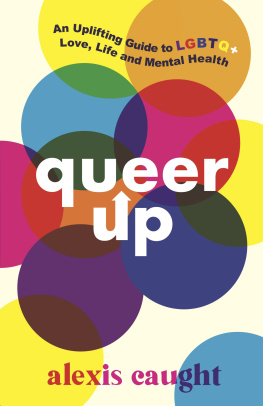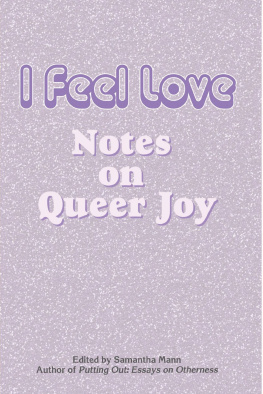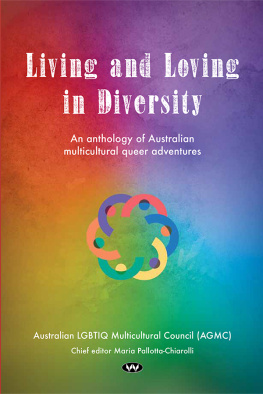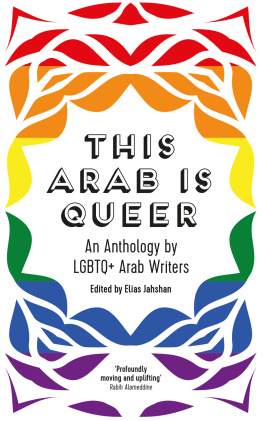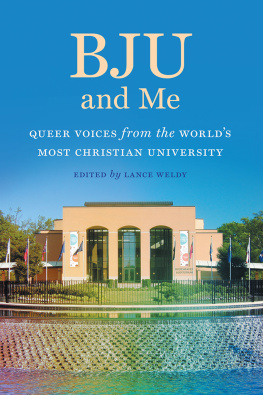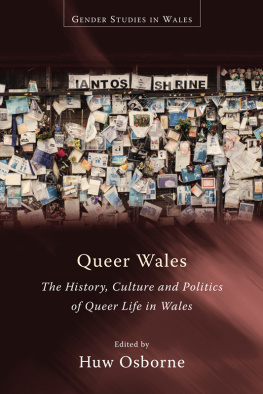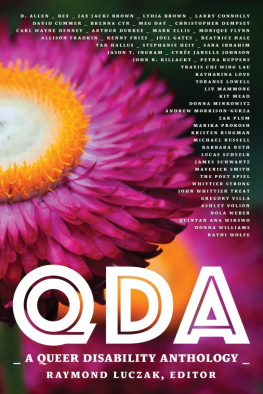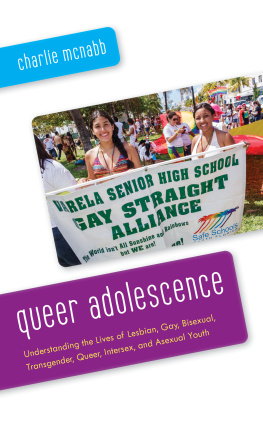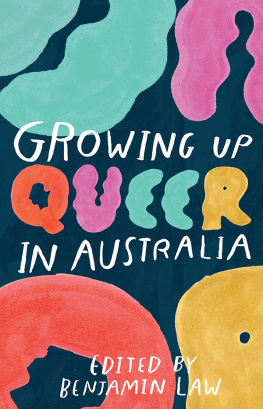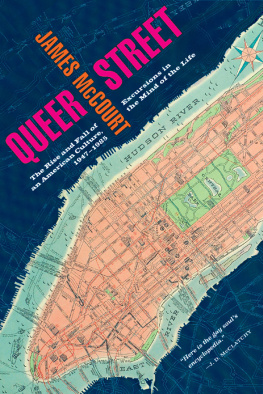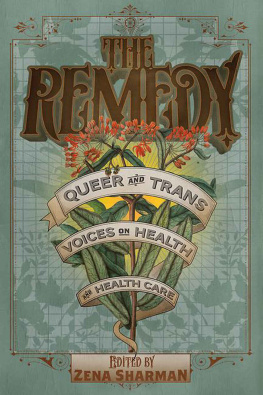The Parkestone Foundation Inc.
Proceeds from the sale of this book go to the Parkestone Foundation Inc.
The Parkestone Foundation was initially constituted as an Association in 1982 following a generous bequest by an Adelaide gay man, Peter Nation, which enabled the establishment of a trust fund. The foundation is managed by a committee of honorary trustees who ensure that the trust fund is used for its intended purpose which is to support LGBTIQA+ community projects consistent with its objectives. Since its inception, the foundation has allocated over $40,000 to support community projects in South Australia.
Additional donations and further information about the Parkestone Foundation Inc.s work can be found at www.parkestonetrust.org
Peering ThroughPublished by the Buon-Cattivi Press, 2018
Adelaide, Australia
ISBN (PAPERBACK) 978-0-9953661-8-3
ISBN (EBOOK) 978-0-9953661-7-6
Book design and cover illustration
by Andrew Crooks
Peering Through
Sharing Decades of Queer Experiences
Edited by Dr Alex Dunkin and Greg Fell
Buon-Cattivi Press
Adelaide, Australia
Foreword
Australias queer history is a complex one. Over the decades identities within the queer community have risen and fallen. Their history can be traced along with the major social and cultural events occurring at the time. Several internationally recognised moments, such as the South Australian decriminalisation of homosexuality, marked major changes in the lives of the LGBTIQ community.
In other cases, such large changes in the legal rights of the LGBTIQ community passed over some who identify as part of the community as they continued to strive for the best in theirs and their family lives. The level of interaction with different moments in Australias queer history provides an interesting tapestry to be collated.
There are lifetimes of experiences hidden out there in the LGBTIQ world. In particular, the elders of the community have held a wealth of knowledge based upon their time growing and thriving in a world designed to attack and sometimes persecute them just for being who they are. Each experience is unique, layered in individual complexities that arrive from living a full life.
Unfortunately the passing of time and the inevitable are causing some of these experiences to fade, in some cases leaving our world when the elder does. Peering Through is just one small step that is seeking to prevent the invaluable lessons from our community from being lost. The stories collected are a beautiful variety of life goals achieved, struggles overcome, and loses recognised. Through this project the stories are released into the world where a new set of voices can be added to the permanent records.
Peering Through
Sharing Decades of Queer Experiences
Contents
Index by Name
| David D |
| David H |
| Gabby |
| Hugh |
| Mahamati |
| Michael |
| Philip |
| Thomas |
| Travis |
Disclaimer
Some names have been changed.
1899
The Beginning of Australian Anti-LGBTIQ Laws.
Australias history in its negative attitude toward LGBTIQ people extends over a hundred years. Like many colonies that preceded it, the country inherited British laws that parliament may later alter or repeal.
Sex between consenting male adults continued to be crimes in some Australian states up until 1997. Female same-sex sex acts were never illegal under British or Australian law, often because people publicly denied that it ever happened.
1940s
Post War Times
The great wars created major disturbances on Australian social, cultural, and political situations. Families were torn apart, laws focussed on the war efforts and the repercussions were felt across the nation. Many LGBTIQ service men and women served in silence and even upon their return to Australia they were not welcomed to be open in the Returned Service League. During their service romantic liaisons did occur and as one serviceman stated we might as well be happy while weve the chance.
The history of the Peering Through Queer Elders begins during and after this period.
Hugh
There are two strands to my story. One about guilt, agonising and desperate soul-destroying guilt, eventually leading to self-acceptance. The other is the light on the hill (which for me was the 1975 decriminalisation of homosexuality in South Australia).
I was born in 1936 and grew up in Sydney. Sydney for other people is the land of the Mardi Gras and gay permissiveness. For me it was the land of aunts. Everywhere I turned Id always see an aunt, and so it was extremely respectable and very restrictive. I was also bought up strict Presbyterian, that means no sex outside marriage and a lot of other little restrictions. Dancing was frowned on. Swearing was not on. You could drink, but only if you were a responsible adult. However, thanks to my mothers warm nature and cultured background, and the enthusiasm of my siblings, I remember an enormous amount of fun and laughter through an atmosphere that often threatened to be too strained.
I was very, very active in the church. I was in the choirI just happened to be born with a good singing voice, I taught in the Sunday school and I led the Fellowship. In other words it was a social centre for me, very much so, and that was quite a problem, to find something to replace that later on, because when youre involved to that extent its actually very supportive and youre very loath to let go.
Michael
I was born in 1943 and grew up in a small country town in the lower-north of SA. My parents were the first of three generations of early settlers to seek employment beyond farming. My fathers family had immigrated from Silesia in 1848, my mothers from Scotland in 1854. Both sides were largely unsuccessful financially, often farming on marginal land and subject to the vagaries of the weather and rural economics.
In the aftermath of the Depression my father undertook a fitter and turner apprenticeship and remained employed in the same manufacturing firm for forty-six years. Because his employment was deemed a reserve occupation during World War II, he was denied enlistment in the RAAF. My mother trained as a nurse in a country hospital.
David H
I grew up in the suburbs of Melbourne around Dandenong, which is about twenty five kilometres out of Melbourne, something like that, very suburban. I have no wish to ever go back there thank you very much. Were talking starting from 1948 when we migrated here. I was a three-year-old and my parents came from the suburbs of metropolitan London, and I remember my mother complaining that the biscuits were made out of sawdust and the transport was terribleit was a red rattler railway carriage. I have never forgotten: in the main street of Dandenong there used to be date palms down the centre and she couldnt get over the fact (coming from London) that there was a woman who literally took horse and jig down the main street who would go to the Dandenong market on Wednesday, so that blew her mind. When you think about it, yes, it would be confronting so there we go.


